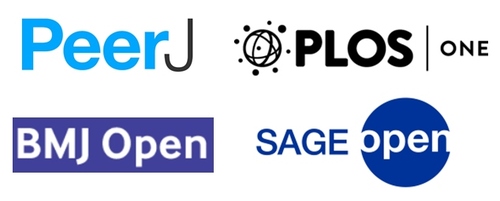Earlier this week, we published “A survey of authors publishing in four megajournals” by David Solomon, Professor at the Department of Internal Medicine and at the Office of Medical Education Research and Development, Michigan State University. This study provides useful information on who is publishing in four megajournals—BMJ Open, PeerJ, PLOS ONE and SAGE Open—and the reasons why.

PJ: Why did you undertake this research? Did you think there was a need for it?

DS: Since PLOS ONE’s success, a growing number of publishers have been launching megajournals. Just in the last 5 or 6 weeks the American Association for the Advancement of Science, the American Educational Research Association and the Royal Society all have announced new megajournals. The growth of PLOS ONE is tailing off a bit, however the total number of articles published by journals using the megajournal format continues to grow almost exponentially. To my knowledge there has not as yet been a study describing the authors and why they are choosing to publish in this type of journal.
PJ: What challenges did you face while doing this research?
DS: It is very difficult to conduct a survey well. One of the biggest challenges is getting a decent response rate. It is also tough to word questions clearly such that they are interpreted consistently by different respondents, particularly when these journals are so international. Despite piloting the survey I wish I had worded a few questions differently.
PJ: Were you surprised by any of the results?
DS: I found the differences among the four journals quite interesting. I was for example a little surprised that PeerJ published considerably fewer articles describing preliminary findings as compared with the other three journals. I was also surprised how many articles the authors had published in the last 3 years in both subscription and OA journals. These are very experienced authors. I would not have guessed that prior to conducting the survey.
PJ: Why did you choose to publish your article in PeerJ rather than some other megajournal—involved or not in the study?
DS: I chose PeerJ for several reasons. As an Academic Editor and the second author on a previous PeerJ publication, I was impressed by the speed and the quality of the publication process. I always prefer to publish in an OA journal, and with no funding for this study, PeerJ offered an affordable means to publish in a high quality OA journal. I am a big fan of the membership-funding model. It is affordable for authors who do not have external funding and want to publish in a quality professional OA journal.
I was a little concerned about a conflict of interest publishing in PeerJ given that it was one of the journals studied. I asked what members of the World Association of Medical Editors thought on their listserv and got 6 or 7 responses, 2 from very prominent editors. None saw it as a problem. Given PeerJ’s open peer review process, anyone can see the very rigorous review the manuscript received. This made me a lot more comfortable that any appearance of a conflict of interest has been addressed.
PJ: Anything else you would like to mention?
DS: I don’t want to sound like an advertisement but this was just about the best publishing experience I have ever had. The initial review took less than 2 weeks and the quality was phenomenal. The reviewers provided excellent detailed constructive feedback that resulted in a much-improved manuscript. The Academic Editor was also excellent, carefully reading each revision and providing detailed feedback within a day or two. Jackie [Head of PeerJ Publishing Operations] was very responsive, and the whole post acceptance publication process went smoothly and was completed in a couple of weeks. I can’t imagine as an author having a better review and publication experience.

